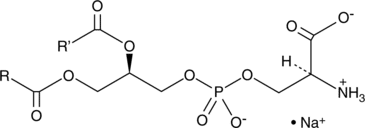Territorial Availability: Available through Bertin Technologies only in France
- Correlated keywords
- PtdSers PSS-1 2 CNS ER phosphatidyl ethanolamine serine TIM1 TIM4 BAI-1 antiinflammatory antiatherosclerotic cRaf1 cRaf-1 sn1 sn2 FA
- Product Overview:
Phosphatidylserine is a naturally occurring phospholipid that comprises 2-10% of total phospholipids in mammals and is enriched in the central nervous system, particularly the retina.{38744} It is anionic and found mainly on the inner leaflet of the cell membrane. It is biosynthesized from phosphatidylcholine (Item Nos. 24343 | 24370) or phosphatidylethanolamine (Item Nos. 16878 | 24332) by phosphatidyl synthase 1 (PSS1) or PSS2, respectively, in the endoplasmic reticulum (ER) and can be reversibly converted back by the same enzymes. It can also be irreversibly converted to phosphatidylethanolamine by phosphatidylserine decarboxylase in the mitochondria. Phosphatidylserine binds to T cell immunoglobulin mucin type 1 (TIM-1) and TIM-4 receptors as well as brain-specific angiogenesis inhibitor 1 (BAI1), leading to anti-inflammatory and anti-atherosclerotic effects.{38745} It is also a cofactor involved in the activation of various signaling pathways through activation of protein kinase C, neutral sphingomyelinase, and c-Raf-1 protein kinase among others.{38744} Phosphatidylserine is externalized during apoptosis by scramblases in the plasma membrane as a signal for phagocytes to engulf the cell.{38746} Phosphatidylserines (soy) is a mixture of soy phosphatidylserines containing fatty acids with variable chain lengths at the sn-1 and sn-2 positions.
Cayman Chemical’s mission is to help make research possible by supplying scientists worldwide with the basic research tools necessary for advancing human and animal health. Our utmost commitment to healthcare researchers is to offer the highest quality products with an affordable pricing policy.
Our scientists are experts in the synthesis, purification, and characterization of biochemicals ranging from small drug-like heterocycles to complex biolipids, fatty acids, and many others. We are also highly skilled in all aspects of assay and antibody development, protein expression, crystallization, and structure determination.
Over the past thirty years, Cayman developed a deep knowledge base in lipid biochemistry, including research involving the arachidonic acid cascade, inositol phosphates, and cannabinoids. This knowledge enabled the production of reagents of exceptional quality for cancer, oxidative injury, epigenetics, neuroscience, inflammation, metabolism, and many additional lines of research.
Our organic and analytical chemists specialize in the rapid development of manufacturing processes and analytical methods to carry out clinical and commercial GMP-API production. Pre-clinical drug discovery efforts are currently underway in the areas of bone restoration and repair, muscular dystrophy, oncology, and inflammation. A separate group of Ph.D.-level scientists are dedicated to offering Hit-to-Lead Discovery and Profiling Services for epigenetic targets. Our knowledgeable chemists can be contracted to perform complete sample analysis for analytes measured by the majority of our assays. We also offer a wide range of analytical services using LC-MS/MS, HPLC, GC, and many other techniques.
Accreditations
ISO/IEC 17025:2005
ISO Guide 34:2009
Cayman is a leader in the field of emerging drugs of abuse, providing high-purity Schedule I-V Controlled Substances to federally-licensed laboratories and qualified academic research institutions for forensic analyses. We are certified by ACLASS Accreditation Services with dual accreditation to ISO/IEC 17025:2005 and ISO Guide 34:2009.





